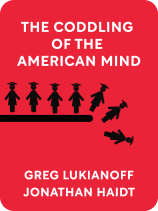

This article is an excerpt from the Shortform book guide to "The Coddling of the American Mind" by Greg Lukianoff and Jonathan Haidt. Shortform has the world's best summaries and analyses of books you should be reading.
Like this article? Sign up for a free trial here .
Why do the authors of The Coddling of the American Mind think that young people today are too fragile and sensitive? What five solutions do the authors provide to the situation?
In their book The Coddling of the American Mind, authors Jonathan Haidt and Greg Lukianoff ponder the question of why people are so sensitive and fragile these days. They came up with five major factors: political polarization, social media, safety parenting, bureaucratization on college campuses, and the evolving social justice norms.
Keep reading to learn how the authors think these five factors are making young people today more fragile.
How Young People Became So Fragile
Why are people so sensitive these days? And what can be done to fix the situation? First, it’s important to understand why young people have come to adopt these attitudes.
Political Polarization
On and off campus, the stark ideological differences between the left and right have led to “negative polarization”—political mobilization centered not on positive support for one’s preferred party, but hatred and fear of the other party.
Left-wing campus activism has invited a fierce reaction from the right, with right-wing media like Fox News often cynically amplifying and highlighting high-profile incidents of left-wing campus activism. The vicious cycle of action, reaction, and counter-reaction further divides the nation and makes it impossible to engage in any meaningful dialogue across the partisan divide.
Social Media and the Dawning Mental Health Crisis
Recent years have seen a troubling rise in the number of teens and adolescents who report feeling anxious or depressed. Suicides and self-harm are up since the dawn of the
2010s, especially for adolescent and teen girls, after remaining relatively steady for decades.
Scholars have noted that social media and excess screentime is highly correlated with depression, anxiety, and self-harm among young people.
If you are unpopular or feel that you are being excluded, social comparison sites like Facebook and Instagram provide minute-by-minute confirmation of your isolated social status by broadcasting the glamorous and fulfilling experiences that everyone else is enjoying. Saturation in the world of social media has left today’s youth more depressed, anxious, and fearful than ever.
Safety Parenting
Today’s parents limit the independent activities of their children to a far greater extent than previous generations of parents, depriving them of growth-enhancing opportunities to take risks and learn from mistakes.
This prevents young people from learning how to realistically evaluate risks when they become adults. They then carry this attitude to college and expect to be protected from “violent” and “dangerous” speech and opinions.
Bureaucratization on Campus
Because higher education is such a big business, universities now require a large, professionalized bureaucracy of administrators to manage them and ensure steady revenue.
As a result, colleges increasingly see students as customers—valuable assets whose needs must be catered to. Fearful of offending valuable customers, administrators have promulgated onerous campus “speech codes” that define what ideas and modes of expression are and are not acceptable on campus. These codes are absurdly vague, arbitrarily enforced, and deeply damaging to free speech on campus.
Evolving Norms of Social Justice
So many of these campus issues revolve around evolving notions of justice. iGen grew up during an era of immense social and political turmoil, particularly around questions of identity and racial and gender equity. As such, they are highly skeptical of traditional racial, gender, and class hierarchies.
The trouble arises when people stop focusing on ensuring equal access to opportunities and start focusing on the equality of material outcomes. Such a shift in attitudes toward social justice began before iGen. An excessive fear of groups being overrepresented or underrepresented leads to the imposition of quotas, in which individuals are judged not on their merits, but on their membership in a particular group.
Solutions: Fostering Antifragility
We’ll now focus on solutions that parents, teachers, professors, and administrators can employ to push back against the three bad ideas and their harmful consequences.
Solution #1: Childhood Independence
Parents should give their children more opportunities to exercise their independence, starting at an early age. This can be as simple as allowing them to enjoy more free and unsupervised play. When they notice conflicts arising among children during play, they should resist the temptation to intervene or make them “play fair.” Parents would also be wise to periodically ask their kids what new challenges they want to take on. Even small milestones like walking to school or friends’ houses on their own can be remarkably self-affirming for kids.
Solution #2: Break Emotional Reasoning
Parents also would do well to teach their kids not to rely on their emotions as their sole guide for interpreting reality. For example, a parent might explain that reality can exist independently of one’s feelings by pointing out that even if someone feels that it’s snowing outside, they might be incorrect—it either is or isn’t snowing. One has to appreciate facts as well as feelings.
Solution #3: Embrace Nuance
Parents should also impress upon their children that no one is purely good or evil. All of us are complex beings with the capacity to do both good things and bad things based upon our circumstances and our state of knowledge at a given time. Even when children are wrong, parents should listen respectfully to their opinions and try to use reason to guide them toward more correct and accurate patterns of thought. This will teach a child that she is not a bad or immoral person simply because she is wrong about something or is in disagreement with someone.
Solution #4: De-Supervise the Schools
Schools should put greater emphasis on recess, with less adult supervision. While kids should always be kept safe, the definition of “safety” should be narrowed to mean only physical safety. School administrators should also strictly limit the use of devices on school property, as they have been shown to disrupt the learning process and increase anxiety and depression.
Solution #5: Defend Academic Freedom
Universities can make a more robust commitment to academic freedom by eliminating campus speech codes. University administrators and presidents should also be more willing to stand up to student outrage. While protestors certainly have the right to voice their opposition to a speaker’s ideas, they do not have the right to prohibit others from hearing a speech or lecture on campus.
The Pursuit of Wisdom
Ultimately, higher education must be about the fostering of wisdom. True wisdom lies in exploring new ideas, confronting entrenched orthodoxies, and having the intellectual strength to reject wrongheaded ideas and accept new knowledge. This commitment to wisdom and truth is real social justice—and it’s what will yield the greatest good, both for students and the society to which they belong.

———End of Preview———
Like what you just read? Read the rest of the world's best book summary and analysis of Greg Lukianoff and Jonathan Haidt's "The Coddling of the American Mind" at Shortform .
Here's what you'll find in our full The Coddling of the American Mind summary :
- The "three Untruths" that have taken hold of young people
- The damage that "speech codes" cause on college campuses
- How colleges are increasingly seeing students as customers






